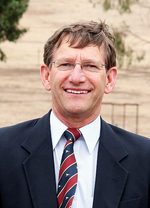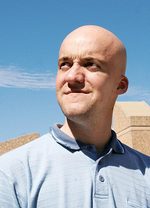Environment focus for new professors
 Environment Environment
Two new professors appointed at the University of Adelaide will address major issues impacting on the environment: climate change and natural resources. Through research and education, their work aims to make a difference to how we address these issues, helping the environment as well as local and global communities.
Irrigation expert to influence use of natural resourcesLeading researcher in irrigation science Professor Wayne Meyer has been appointed as the University of Adelaide's new Chair of Natural Resources Science. Professor Meyer will lead a natural resource science team whose work will inform and influence the management of Australia's natural resources.
"While others are currently focussing on natural resource issues surrounding water, there will be increasing recognition that the quantity and quality of water is dependent on the condition of soils and vegetation and, hence, land use," Professor Meyer said. He brings together biology, ecology, soils and water management and agriculture. "I aim to make the University of Adelaide the main provider of quality graduates in natural resources science in Australia," Professor Meyer said. "This will be built on a research base that uses some of the developing remote sensing, computer modelling and visualisation IT to provide improved information for regional natural resources management." Faculty of Sciences Executive Dean Professor Bob Hill said: "Professor Meyer has a wealth of research and project management experience in the management of soils and water in irrigated areas. "His appointment builds on the University's existing strengths in agriculture, ecology, genomics, resource economics and the technologies of modelling, remote sensing, visualisation and computing to form the basis of what will be a globally significant research team." Professor Meyer comes to the University after a long career in CSIRO where he was the founding Chief Executive Officer of the Cooperative Research Centre (CRC) for Irrigation Futures and, for the last three years, has been the CRC's Chief Research Scientist. Professor Meyer said current development of state and regional National Resource Management plans provided the ideal opportunity for research in this field to influence plans for restoration, maintenance and conservation of Australia's natural resources. Story by Robyn Mills
Climate change research has new championThe University of Adelaide is to play a leading role in climate change research, with the appointment of a new Professor of Climate Change and the establishment of the Research Institute for Climate Change and Sustainability. Established with funding from the State Government and the University of Adelaide, the Institute will be headed by Professor Barry Brook, who has taken up the position of the Sir Hubert Wilkins Chair of Climate Change. As part of his role, Professor Brook will help to advise government, industry and the community on how to tackle climate change. He said the Institute would draw together expertise in climate change from across the University. "A cross-disciplinary approach to climate change is extremely important, because climate change has the potential to affect many different aspects of our lives," Professor Brook said. "Through the Research Institute for Climate Change and Sustainability, researchers will be able to form better synergies and focus research efforts in a strategic way to meet the needs of the State and the nation. "The Institute will also serve as an important vehicle for public communication. Through the Institute, we will be able to inform the public about the science that's being undertaken into climate change and how it can benefit them." In announcing Professor Brook's appointment, which is funded by the Department of Premier and Cabinet, Premier Mike Rann said: "The impact of climate change on South Australia cannot be underestimated. We are already seeing the effect drought is having on our water resources, and as these conditions continue we will have to deal with the impact on our wildlife and native vegetation." The Chair of Climate Change is named after Sir Hubert Wilkins, a South Australian who spent his life researching the weather and how it impacts on people. Vice-Chancellor and President of the University of Adelaide Professor James McWha praised the State Government for its vision in making this appointment. "This initiative is further proof of the impact the University of Adelaide can make on the community," he said. "The University has many researchers working in areas that are key to the climate change issue - soil, plant and water scientists, engineers, architects, demographers, and many others. The new Institute will provide an excellent opportunity to bring this expertise together." Previously a Professorial Research Fellow at Charles Darwin University, Professor Brook's contributions to the fields of conservation biology, population modelling and extinction theory are recognised internationally. Story by David Ellis
Science prize for climate change expertProfessor Barry Brook has been awarded the prestigious Edgeworth David Medal from the Royal Society of New South Wales. The medal is awarded for distinguished contributions by a scientist under the age of 35 in any discipline, for work in Australia or which assists the advancement of Australian science. The Royal Society praised the depth of Professor Brook's work over a relatively short period of time. He has produced more than 75 publications, including two books, in a variety of fields, which include wildlife management, landscape ecology, ecological economics, ecosystem modelling and conservation genetics. In 2006 he was the youngest ever recipient of the prestigious Fenner Medal by the Australian Academy of Science for distinguished research in plant and animal science. He has won nine ARC grants since 2001. Professor Brook's work was "particularly relevant at the present time of climate change and its implications for the changing ecology of the world", the citation for his Edgeworth David Medal said. "Professor Brook has another valuable attribute for these times. He is a skilled public communicator and has made many contributions to the print and electronic media. We need such scientists, who have the ability and the energy and the patience to persistently argue the case for rational thought and scientific methods over economic dogma and rich lobby groups," the citation said. Story by David Ellis
|








